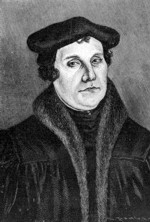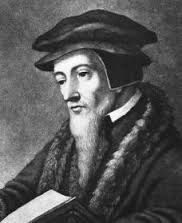THE PROTESTANT REFORMATION
Joshua Yong
31 October 1517
The Reformation which took place nearly 500 years ago is a very important event in history. When we think of the Reformation we think of what happened on 31 October 1517, the eve of “All Saints’ Day”. On that day, Martin Luther nailed his 95 theses on the castle-church door of Wittenberg. This castle-church was called “All Saints Church”, and was located near the University in Wittenberg where Luther was professor of theology. His theses opposed the practice of indulgences.
On “All Saints’ Day”, the Roman Catholic Church would venerate the relics of saints and martyrs. Large crowds would gather believing that by venerating these relics they would find pardon for their sins. On such a day, Martin Luther nailed his 95 theses. In those days, when a scholar wanted to call for a public debate, they would post the topics to be discussed on the university or church door. Luther was calling for a debate when he posted his 95 Theses. On that same day copies of Luther’s theses were sent to the archbishop who was in charge of indulgences. Within two months, Luther’s theses written in Latin were translated, printed, and distributed throughout Europe. This sparked the Reformation in Europe.
Martin Luther

Who was Martin Luther who dared to stand against the most powerful religious and political organisation of his day? He was God’s man. God prepared the right man at the right time to do His good work. Let us see how God prepared Luther for the great work of the Reformation.
Martin Luther was born in 1483 in Eisleben. In 1501, he began his studies in the University of Erfurt. Erfurt was a nice, quiet but affluent town in Germany which traded with woad through which blue dye was produced. In this university, Luther graduated with his Masters’ degree in 1505. Luther was about to pursue further studies in law, but when God heard his prayer and delivered him from death when he was caught in a severe thunderstorm, he gave up his academic pursuits to become a monk.
Luther entered an Augustinian monastery in Erfurt. The monks lived a very strict life. They gave themselves solely to prayer and work. Their day would begin at two in the morning when they congregated in the church to pray. They had a chapter room where every day, a chapter of the rules of the Augustinian order were read out loud. The more rules you have, the more rules you would break. The monks lived by this rule, “If I do something wrong, I must be punished.”
Not Works but Faith
As a monk, Luther thought that he could receive forgiveness of sins through the confessional. At the confessional, every sin must be confessed. As a perfectionist, Luther spent hours confessing his sins, and worried constantly that he might have forgotten to confess one. He wrote, “Sometimes my confessor said to me when I repeatedly discussed silly sins with him, ‘You are a fool. Man, God is not angry with you, but you are angry with God.’” Once, Luther was so filled with guilt that he whipped himself until he bled and nearly died. It was in the midst of such a struggle to find peace that he studied the Scriptures and read Romans 1:17, “For therein is the righteousness of God revealed from faith to faith: as it is written, The just shall live by faith.” When he believed this, Luther testified how he felt he was “altogether born again.”
Prepared by God
One thought that came to mind as I looked at the life of Martin Luther was this—God prepares the instruments He will use. God can use anyone no matter how weak to do His work and fulfil His will. And if God has chosen to use someone, He would prepare him for the task by bestowing upon him the talents and the gifts necessary. Luther had to go through the experiences of failure to find peace with God. The education he received from the university and the discipline that was instilled in him in the monastery were all God’s preparation of Luther. This caused me to think of how I must remain consecrated and faithful in God’s service.
Luther found peace and deliverance simply through the study of and belief in God’s Word. This was indeed God’s great mercy and working. How were the people going to break free from the stranglehold of the Catholic Church? It must be simply through the Word of God. This brings us to another Reformer whom God prepared and used.
John Calvin

John Calvin was born in Noyon, France in 1509. God used him as the theologian of the Reformation. With the patronage of a wealthy French family, Calvin studied in a college in Paris before entering the University of Orleans to study law and later in Bourges to spend time in classical studies. It was there that he studied Greek and the Greek New Testament. It was through the study of the Greek New Testament, that John Calvin came under the conviction of sin in 1533. He went through a long spiritual struggle before he found peace and salvation in the Lord Jesus Christ.
Irresistible Call
Persecuted in France for his faith, Calvin fled to Basel where he completed his great work—The Institutes of the Christian Religion —in 1536. He then set off for Strasbourg to retire there. On his way to Strasbourg, he was forced to make a stopover in Geneva. It was in Geneva that he met another Frenchman and Reformer, William Farel. Farel forcefully persuaded Calvin to stay in Geneva to reform the church there. Calvin testified, “Then Farel, who was working with incredible zeal to promote the gospel, bent all his efforts to keep me in the city. And when he realised that I was determined to study in privacy in some obscure place, and saw that he gained nothing by entreaty, he descended to cursing, and said that God would surely curse my peace if I held back from giving help at a time of such great need. Terrified by his words, and conscious of my own timidity and cowardice, I gave up my journey and attempted to apply whatever gift I had in defense of my faith.”
Calvin ministered in Geneva from 1536 to 1538. However, because of his strict application of the Scriptures and opposition from the Libertines, Calvin was kicked out of Geneva in 1538. Martin Bucer then invited Calvin to pastor a church in Strasbourg, which Calvin accepted. From 1538 to 1541, he pastored the church in Strasbourg. After this, he went back to Geneva again in 1541.
In Strasbourg, a Reformed church where Calvin was pastor still stands. The building is a mark of simplicity. The Roman Catholic cathedrals, on the other hand, are very grand and elaborate. The Catholic Church spent a lot of money to build their cathedrals. This appealed to the carnal senses of the people—sight (high steeples), sound (pipe organs), smell (incense), touch (marble and statues). In an age of darkness without biblical teaching, the people thought that the grandness of these cathedrals brought them closer to God.
Against Indulgences
You might be wondering, where did the Catholic Church get all the money to build their grand cathedrals? The answer is in part through the sale of indulgences. This brings us back to Wittenberg. In 1511, Luther moved from Erfurt to Wittenberg to be the Professor of Theology in the university there. The Augustinian monastery in which he stayed later became his house. It was this time that the battle with the Catholic Church began. In order to finance the building of St Peter’s Basilica in Rome, the Catholic Church commissioned a man named John Tetzel who went around selling indulgences, singing this jingle—“as soon as the coin in the coffer rings, the soul from purgatory springs.” The sale of indulgences angered Luther. He saw it as corruption within the Church. This led to the nailing of his 95 Theses.
Having nailed his 95 Theses in 1521, Luther was summoned by the Roman Catholic Church to the Diet of Worms. A diet was a formal deliberative assembly, where Luther was called upon to answer for his writings. In this diet, Luther was asked if he was ready to recant his writings on the Reformation. It was there he declared, “Unless I am convinced by the testimony of the Scriptures or by clear reason…, I am bound by the Scriptures I have quoted and my conscience is captive to the Word of God. I cannot and will not recant anything, since it is neither safe nor right to go against conscience. May God help me. Amen.” The power of the Word of God fuelled the Reformation.
God’s Word Alone
The Reformers saw the importance of God’s Word in the lives of the believers. The Reformers were men of conviction who stood for what they believed was God’s truth based on Scripture. They did so even at the expense of their own safety and life. As we think about convictions, we cannot help but think of men like John Hus who came years before Luther. For preaching the gospel, John Hus was tried and condemned by the Council of Constance and burnt at the stake in 1415. The Reformers were very strong in their convictions, in the truths of the Holy Scriptures. It is important that our convictions be founded on God’s Word and God’s Word alone.
In history, we see how God prepared and used the right people for His work at His own timing. The printing press was invented by Johan Gutenberg only slightly less than 100 years before the Reformation. This allowed the Bible to be printed and distributed rapidly. It is also amazing how God raised up these reformers—brilliant men of faith and conviction—at about the same time. All things happened in the fullness of time.
We are thankful that the story and spirit of the Reformation continues till this day. As God was the Helper of the reformers, He will still be our Helper today. May we have the same confidence as the psalmist in Psalm 46:1-5, “God is our refuge and strength, a very present help in trouble. Therefore will not we fear, though the earth be removed, and though the mountains be carried into the midst of the sea; Though the waters thereof roar and be troubled, though the mountains shake with the swelling thereof. Selah. There is a river, the streams whereof shall make glad the city of God, the holy place of the tabernacles of the most High. God is in the midst of her; she shall not be moved: God shall help her, and that right early.”


